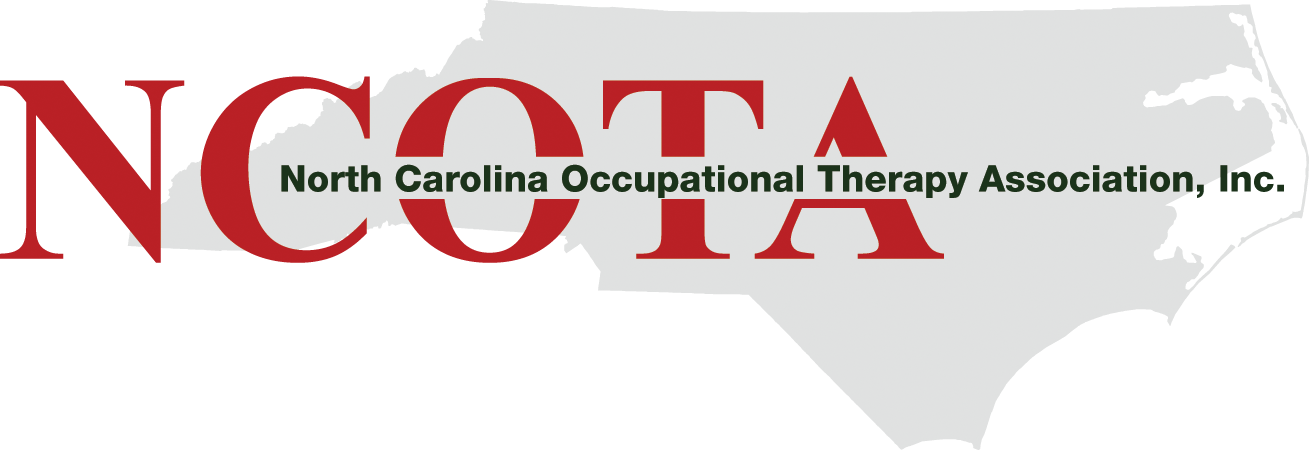|
Advocacy is a vital part of the Occupational Therapy profession. Advocacy is at the core of NCOTA’s mission and we strive to advocate for changes that our membership feels are important for the OT profession. Each year the NCOTA Board of Directors, with support from our lobbyist, identifies legislative priorities. These priorities guide our actions and decisions, how we allocate resources, and our messaging to our membership. Our legislative priorities are listed below. Having something you think should be added? Please email us at [email protected]!
NCOTA Advocacy Priorities
Learn about the NC General Assembly and Government structure in this educational document from UNC Contact your legislators today! Learn how in this video below:
2026 Legislative UpdatesStay tuned! We are continuing our advocacy priorities from 2025. 2026 is a short-session for the NC General Assembly starting on April 21, 2026
2025 Legislative UpdatesOctober Medicaid Fee CutsNC Governor Josh Stein undid the 3% reimbursement reduction for Medicaid OT services on December 10, 2025. All funding was restored to the pre-cut levels. Thanks to our advocacy efforts, NCOTA Vice President Clarice Grote, MS, OTR/L, was invited to join North Carolina Governor Josh Stein at a press conference announcing the reversal of Medicaid reimbursement provider cuts implemented in October—including the 3% rate reduction for outpatient specialized therapies like occupational therapy. With support from AOTA, NCOTA and other state associations will continue advocating for fair Medicaid payment policies that protect patient access to care. Read the governor’s press release: https://governor.nc.gov/news/press-releases/2025/12/10/governor-stein-continues-stand-3-million-medicaid-patients-north-carolina-directs-ncdhhs-restore Although this is a fantastic advocacy win, we are still counting on the legislature to pass a budget to fully fund Medicaid and to hopefully prevent future cuts from occuring. NCOTA will continue to dilligently track any announcements regarding funding for OT services and will continue our advocacy efforts for rate increases.
10/1/2025
Dear Members, We are aware of today’s Medicaid fee schedule posting, which reflects an 8% reduction for 99% of OT codes, despite prior notice indicating a 3% cut. We recognize this discrepancy and are actively seeking clarification. Currently, we strongly encourage all providers to reach out to the Medicaid Provider Ombudsman at: [email protected] When you contact the Ombudsman, please reference a claim with an adjudication that reflects the 8% cut, as this will be critical in demonstrating the issue. Please note that a few OT codes currently remain set at the 3% reduction. We deeply appreciate your continued advocacy during this challenging time. NCOTA will share definitive updates as soon as they are available. If you have additional questions regarding the fee schedule changes or the date on which fee schedules will be available, please contact the DHB Provider Reimbursement Team at [email protected].
Despite funding shortfalls in the state's stopgap budget passed on July 30, the State House legislative leadership has instructed NCDHHS to suspend its proposed reductions to both reimbursement rates for providers and covered services. Currently, a continued CALL TO ACTION (Find your representatives here) is needed by reaching out to your representatives and sharing how your personal OT experience for your clients, patients, students, and job. Highlighting: 1- The proposed cuts to the OT Medicaid fee(s) schedule and a need to fully fund the Medicaid rebase. 2- Consider acknowledging their attentiveness to both your advocacy efforts for OT and the broader community interests. We will continue to share updates and status changes as we receive credible information about the decisions being made. Your commitment to OT in North Carolina is valued, and our combined outreach to legislators produces the most significant results. Your efforts for ADVOCACY are working, please continue to remain in contact with your legislators. URGENT: NCOTA Advocacy Alert - Proposed Medicaid Rate Cuts
The NCOTA advocacy team attended today's NCDHHS meeting where planned Medicaid cuts were announced. These proposed changes will significantly impact both services and reimbursement rates for occupational therapy providers across North Carolina. Key Details from Secretary Sangvai's LetterEffective Date: October 1, 2025
NCOTA's ResponseOur advocacy team is developing an urgent action plan to address these proposed cuts. Time is critical as we work to advocate with the NC General Assembly to:
Next StepsStay Alert: We will be reaching out soon with specific ways both NCOTA members and non-members can participate in these urgent advocacy efforts. Your voice and action will be essential in protecting occupational therapy services for North Carolina's Medicaid beneficiaries.
2024 Legislative Priorities
Increase Salaries and Bonuses for School-Based OT Practitioners. In order to recruit and retain school-based occupational therapists that provide students with essential OT services in grades K through 12 throughout North Carolina schools, the General Assembly should pass legislation that will increase school-based OT salaries so that they are in line with the salaries of other school-based masters level health professionals. School-Based OTs should be ensured predictable, progressive compensation over a reasonable number of employment years (no more than 35) across the entirety of the salary range currently identified for the profession by NCDPI. In addition, OTs should be provided the same employment protections and salary increases, as well as State and local supplements and bonuses, as allotted to other master’s level professionals like speech/language pathologists and school psychologists. These provisions might be met while keeping OTs on the Classified Salary Schedule or by moving OTs to the Certified Salary Schedule while retaining the salary range currently identified for this profession by NCDPI. Occupational therapists’ level of education, licensure requirements, and continuing education requirements are all comparable to that of the other master’s level professions included in the certified pay scale. Current provisions for OTs on the Classified Salary Schedule result in unpredictable and unreliable compensation changes across employment tenure and between neighboring LEAs and no access to the same increases, supplements, and bonuses afforded professions with highly similar educational requirements and job responsibilities, resulting in significant challenges for most LEAs in recruiting and retaining OTs.
Expansion of Telehealth opportunities for occupational therapy in North Carolina: We urge the General Assembly to support telehealth opportunities for occupational therapists like those adopted in other states with great success. Occupational therapy is an excellent example of a health care service that can be effectively utilized in the telehealth environment. Utilization of telehealth for occupational therapy during the COVID-19 pandemic has resulted in positive outcomes for patients throughout North Carolina.
Need for expanded resources for OTs who practice in the public school setting: We urge the North Carolina General Assembly to increase funding for children with disabilities. We also support allowing schools to access Medicaid reimbursements for services to students in both traditional public schools and public charter schools.
Increased access to occupational therapy should be an essential part of Medicaid Transformation: Occupational Therapy benefits patients with a cost effectiveness that often keeps patients from having to endure more extensive and costly procedures. As the Legislature works to implement Medicaid Transformation, increased access to occupational therapy should be included in the transformation framework.
The General Assembly should pass legislation to close the Medicaid coverage gap: Closing the Medicaid coverage gap would cover an estimated additional 500,000 North Carolinians and would provide those individuals with essential health care, including occupational therapy. NCOTA supports effort to expand Medicaid and provide individuals with greatly needed health coverage.
Medicaid should cover occupational therapy for individuals over 21 in a private practice setting. Currently, North Carolina’s Medicaid policies fail to provide coverage for occupational therapy for individuals over 21 seen in a private practice setting. This often means that individuals in need of occupational therapy go without these services and end up in a much more severe health crisis. Medicaid policies should be updated to include Medicaid coverage for occupational therapy for individuals over 21 seen in a private practice setting.
The mental health benefits of occupational therapy should be supported via legislation and policy. Occupational therapy not only provides individuals physical health benefits but also significant mental health benefits. Occupational therapy empowers individuals to reach their individual potential and gives them the skills to successfully conduct their daily lives and maintain safe and healthy routines. Occupational therapy addresses performance deficits, regardless if the issues is mental or physical in nature. Legislation and health policies should be updated to reflect the beneficial outcomes on mental health provided by occupational therapy.
|

